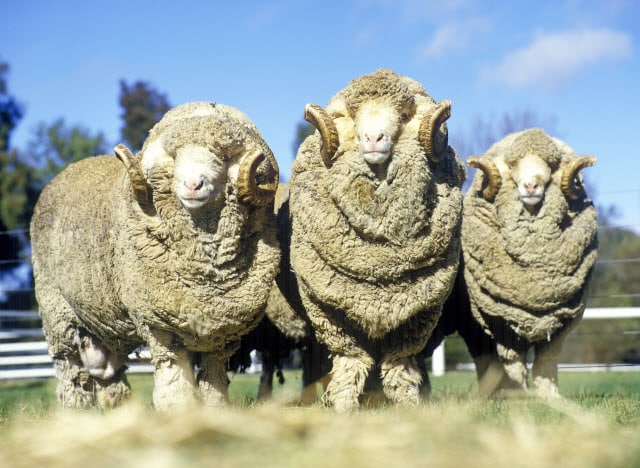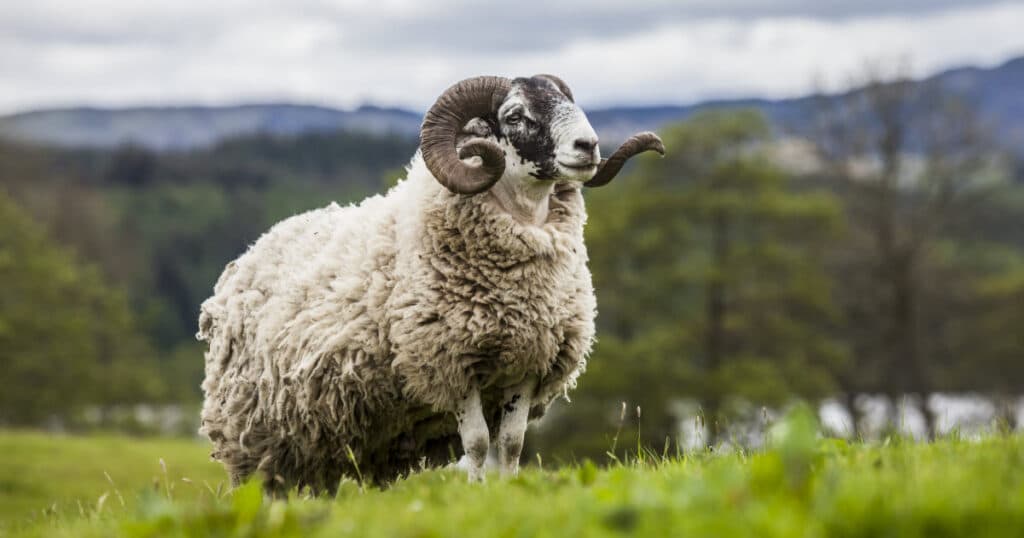While many people group male sheep and female sheep together under the umbrella term “sheep” – did you know that male sheep are called many different things? The age and even the location on the globe can dictate what a male sheep is called.
The Names for Different Types of Male Sheep
A young male sheep is called a ram lamb – usually until the ram has reached a full year old. Once a ram is a year old he is considered an adult. But if you show your sheep you’ll find that rams between one and two years old are called yearling rams.
Occasionally shepherds will own a ram which isn’t fertile. There are two names for a ram who cannot sire lambs:
- A wether is a ram which has been castrated (typically these are market or club lambs which are being raised for meat. Castration simplifies life for the shepherd as all of the ram and ewe market lambs can be kept together without risk of pregnancy).
- A teaser ram is a ram which has had a vasectomy. While it may seem odd to perform a vasectomy on a ram, shepherds occasionally do this to an aggressive ram with a high sex-drive. They then use this ram to encourage a flock of ewes to begin estrus earlier than they might if mother nature took its course. This can be a good way to have lambs delivered early so that your lambs perform well in the show ring.
| Male Sheep | What is it Called? |
|---|---|
| Young Male Sheep | Ram Lamb |
| Castrated Male Sheep | Wether |
| Adult Male Sheep | Ram |
| Slang for Adult Male Sheep | Buck |
| Name for Male Sheep in the UK | Tup |
| Male Sheep Without Horns | Polled |
| Male Sheep With Horns | Horned |
What is a Male Sheep Called in Different Parts of the World?
In some parts of the world a male sheep is called different things. While a ram is universally understood as being a proper name for a male sheep, in some areas a male sheep is called a buck – the same name given to a male deer. This isn’t a traditional name for a male sheep, but it’s not uncommon to hear this label given to rams at larger livestock shows in the US and elsewhere.

In the UK a male sheep is called a tup quite often. The act of a ram mating with a ewe is sometimes referred to as “tupping.” In fact this is a line which was used in the early pages of Shakespeare’s play, Othello to crassly refer to Othello’s relationship with Desdemona.
Not all male sheep have horns, but some do. Rams without horns are referred to as polled rams and male sheep which grow a rack of horns are called horned rams.
Unlike deer (which shed their antlers each year), male sheep with horns don’t shed their horns. Rather, they continue to grow throughout their lifetime.
What is a male sheep called where you’re from? Let us know in the comments below!


ram is what i call a male sheep
what do you call a male sheep?
f
what are the names for rams or wethers that have undecended / undetectable testicles, or other such issues?
I live in the UK and worked on a farm 20+ years ago and we call the male sheep rams. I’ve never heard of a tup before. I’ve never read Shakespeare if that’s what your basing it from. I would of liked to see where and who introduced this name tup, and what year it’s from. As we’ve got to be careful to not be biased as the media are.
I am living in Austria and I heard both words ram and tup. Matter of factly in the US most people don’t know about tups and in Scotland and Wales (where most of my sheep friends are and my daughter works in sheep husbandry) ram is never used but only tup. I was though about surprised that sheep price in the UK is told in g instead of brit pounds 🙂
Tup is used in Suffolk uk all the time